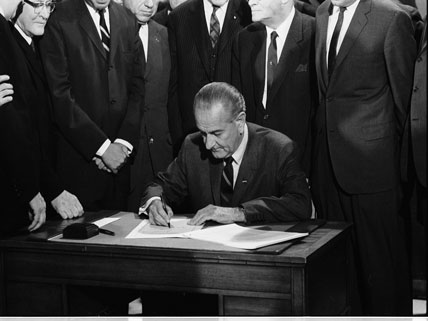President Lyndon B. Johnson signs the Civil Rights Act of 1968, which added fair-housing protections to the Civil Rights Act of 1964.
The passage of the landmark Civil Rights Act of 1964 was commemorated in Austin, Texas, on April 8–10. The event was held at the Lyndon B. Johnson Presidential Library to honor the president who signed the bill into law 50 years ago. In attendance at the three-day Civil Rights Summit were President Barack Obama and three living former presidents—Jimmy Carter, Bill Clinton, and George W. Bush. Each man gave a speech recognizing the legislative achievement that was a pinnacle of the civil rights movement.
The impact of the Civil Rights Act was so broad and far-reaching in shaping daily life that it has been called “the law that created modern America.” The act outlawed discrimination based on race, sex, religion, or national origin by employers and government agencies and banned discrimination in public accommodations, such as hotels and motels, restaurants, theaters, bus and train systems. It also encouraged public schools to desegregate. Ultimately, the act advanced the promise of equality under the law for all Americans. On the occasion of the law’s signing, President Johnson was joined by the Reverend Martin Luther King Jr. The 1964 act was followed by the Voting Rights Act in 1965 and the Fair Housing Act in 1968 (also called the Civil Rights Act of 1968), which together created a legislative triumvirate to protect the civil rights of minorities in America.
A Civil Rights Bill was originally proposed by President John F. Kennedy in June 1963, in the wake of numerous protests by African Americans and civil rights groups. After the assassination of President Kennedy in November of that year, his successor, Johnson, urgently called on Congress to pass the legislation. Several months later, following the longest continuous debate and the longest filibuster in the history of the Senate, the law passed. It had bipartisan support, though a higher percentage of Republicans than Democrats voted in favor. Less than 10 percent of representatives or senators from the states of the former Confederacy voted for the bill.
Image credit: © Library of Congress Prints and Photographs Division Washington
Related Links
- Civil Rights Summit
Visit the official website of the organization that hosted President Obama and ex-presidents Jimmy Carter, Bill Clinton, and George W. Bush to commemorate the 50th anniversary of the passage of the Civil Rights Act.
(Source: civilrightssummit.org, April 8–10, 2014) - Landmark Legislation: The Civil Rights Act of 1964
This article recounts the legislative history that culminated in the Senate’s vote to pass the Civil Rights Act of 1964.
(Source: Senate.gov; accessed April 25, 2014) - What You Might Not Know about the 1964 Civil Rights Act
Read interesting facts about the Civil Rights Act; includes video of Martin Luther King Jr. and Malcolm X meeting.
(Source: CNN.com, April 10, 2014) - Civil Rights Act
Watch this brief video on the historic legislation that prohibited racial discrimination after years of struggle for civil rights and equality for minorities; includes links to other videos on the civil rights movement and to content covering the act’s context and consequences.
(Source: History.com; accessed April 25, 2014)





hey
this is cool